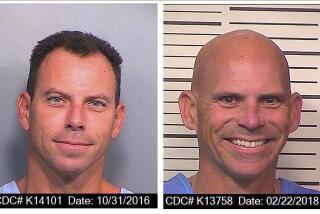Man Serves Brother’s Prison Term, Officials Say : Incarceration: Prosecutors may bill him for six months’ room and board. But the two have since disappeared.
Apparently guilt-stricken over leading his younger brother into crime, a Simi Valley man served the brother’s six-month prison term, a Los Angeles County sheriff’s detective said Monday.
Now, prosecutors are considering billing Crispian Rawlings $9,000 in room and board for the six months that he spent as a taxpayer-supported convict--if they can find him. He and his brother, Eric, recently disappeared.
“He got free meals, free bedding and free medical,” Sheriff’s Detective John Benedict said.
It was Benedict who discovered that Crispian Rawlings, 25, actually had served the prison sentence imposed on Eric Rawlings, 23, for a parole violation after a robbery at knifepoint of a San Fernando Valley woman in 1992.
“I think Chris (was) feeling somewhat guilty” about getting his brother involved in criminal activities, Benedict said. “He (was) trying to be a big brother.”
In 1992, the Rawlings brothers--who look remarkably alike--robbed the woman, who was an acquaintance, Benedict said. On Jan. 6, 1993, Eric Rawlings pleaded no contest to second-degree robbery charges and was sentenced to a year in prison and three years’ probation, Benedict said.
Charges against Crispian Rawlings were dropped when the robbery victim vanished, Benedict said.
With credit for several months spent in County Jail awaiting trial, Eric Rawlings was soon released, Deputy Dist. Atty. Ken Barshop said. But on June 22, 1993, a warrant was issued for his arrest because he skipped an interview with his probation officer, Barshop said.
In August, a man identifying himself as Eric Rawlings walked into Superior Court Judge Meredith Taylor’s court and turned himself in on a parole violation. He was sentenced to two years in prison and was shipped to the state facility in Wasco, Barshop said.
He was released six months later for good behavior.
That man, authorities contend, was Crispian Rawlings, who next surfaced in June, 1994, when he was questioned by Benedict after his arrest on suspicion of credit card theft.
Benedict had assembled a file on Crispian Rawlings. Knowing that the brothers were close, he also had information on Crispian’s younger brother. While questioning Crispian Rawlings, he glanced at a jail photograph purportedly of Eric Rawlings.
As Benedict tells it, he glanced up at Crispian Rawlings seated across the table. He glanced back at the photo and again at Crispian.
“You and your brother look really alike,” Benedict recalled saying.
The man in the photo was bare-chested, his tattoos showing. Benedict said he told Crispian to take off his shirt. Crispian, who stammered and turned red but complied, had tattoos that matched those in the picture, Benedict said.
At that point, Benedict said, Crispian confessed to the swap.
After that, Crispian Rawlings was convicted of the credit card charge and served about four months in County Jail, authorities said.
During that stay, Benedict referred the identity-swap case to the district attorney’s office for prosecution as grand theft from the state, which could bring a five-year prison term. And in January, the district attorney’s office issued a warrant for Eric Rawlings’ arrest on the revived parole violation count.
But by then, both brothers had vanished.
At no point in Crispian Rawlings’ jail stay had anyone checked his fingerprints against those of Eric Rawlings, authorities said. When the man claiming to be Eric Rawlings surrendered to the court, he was taken into custody without being fingerprinted, said Sheriff’s Lt. George Sennatt.
By surrendering to the court, Rawlings avoided standard fingerprint checks on his identity. When “Eric Rawlings” was sent to County Jail, Sennatt said, he was fingerprinted, but those prints were not checked against those of Eric Rawlings. “If the court says that’s who he is, and he came to us and didn’t tell us any different, that’s what we accepted,” Sennatt said.
Although Crispian Rawlings surrendered in the same courtroom where Eric Rawlings had pleaded no contest to second-degree murder charges earlier that year, no one recognized the swap, Barshop said.
“You’re talking about something that’s happened months before,” Barshop said. “No one would remember a run-of-the-mill case” such as Eric Rawlings’ robbery plea.
More to Read
Sign up for Essential California
The most important California stories and recommendations in your inbox every morning.
You may occasionally receive promotional content from the Los Angeles Times.










